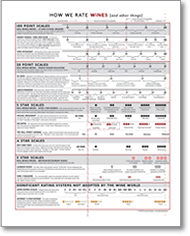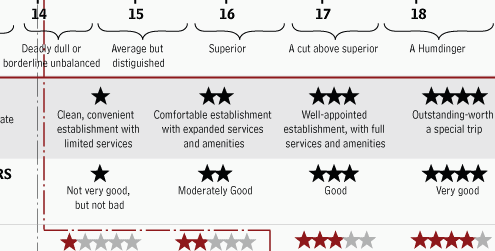Note: the bulk of this article is an accompanying chart that compares the major scoring systems now used, from 3 stars to 100 point scales (see it online here).
If you watched the movie Mondovino, you may have come away with the impression that the 100 point rating wine rating system is the root of all evil. But what about all the other wine rating systems? Are they evil as well? Of course they’re evil! But more of a necessary evil than a vast dark conspiracy. With a few prominent exceptions – Hugh Johnson, Oz Clarke, Robin Garr come to mind – all wine writers use them in one form or another. Take a look and judge for yourself.
I'm a recent convert to the 5 star system from the 100 point system. Why? I swear it has nothing to do with a recent move from the US to the UK (so I don’t want to hear any “dude, why do you hate your country?” comments). Instead, it's because I found myself spending too much time dwelling on meaningless distinctions such as: "is it an 88 or an 89, etc." I then swore off ratings altogether aside from putting one star or two stars on notes of wines I found exceptional. After doing this for a few years, the Eureka moment struck: “why not just use a 5 star system?” I like the 5 star scale because of its simplicity but don’t feel strongly enough about it to fiercely defend it.
It just seems that debates over wine rating systems resemble PC vs. Mac arguments: they just don’t go anywhere. The choice of a rating scale is just as personal as the act of rating wines; at the end of the day they’re simply useful tools and not declarations of political affiliation.




Comments
Hi Frank-
Nice system. I’ll have to put together another chart of yours, Erics and other rating systems that I couldn’t fit on one page!
Hi Roger,
I completely agree regarding the pseudo scientific perception of wine scoring systems. The majority of consumers who see them on a shelf talker probably don’t realize that they actually represent the opinion of one or a few people. Hopefully one of the things that this comparison chart shows is just how many different systems there are out there and how the wine world is not nearly as neat and precise as some people would like it to be. Perhaps this is one of the reasons I prefer a star system as it doesn’t pretend to be accurate.
Still, I don’t really object to 100 point scales. This may be due to the fact that my schoolwork was graded on that system; I was fully aware that the 88/100 on an essay could easy be a 94/100 depending on which teacher graded it. The real problem with the 100 point systems is on the receiving end. People who completely buy into them don’t really care enough about wine to actually read the reviews and probably never will.
You make a nice point about the five-star system. I think there’s a degree of disingenuousness in not rating wines at all. Often a wine will be better or worse for reasons which are extremely difficult to elaborate in an articulate fashion. Wine reviewing in a coherent, painterly manner is tremendously difficult, as there are so few variables on which to focus. Similarly the metaphors are nearly always artificial. In never offering some degree of quantifyable comparison, the reviewer chickens out of letting us know the gauge of his or her palette. By merely using analogies and adjectives, the notion of quality and of putting your vote behind it, can nearly always be hidden.
That said, the 100-point scale is absurd. And let’s be honest, Robert Parker and co. don’t really use a 100-point scale. If they did, there would be lots of 20’s and 30’s. Have you ever seen an expensive Bordeaux under 80? 85? He’s really just using a 15-pont scale. And even that is a little precious. There are an infinite number of available wine experiences (you’ve taught me that), but there aren’t 100 gradations on that scale of experience — at least ones that are numerically meaningful.
Thanks, Fred. Perhaps the most disingenuous thing about the 100 point system is that it isn’t done completely blind. Before a sip is taken, the basic lineup of the tasting is pretty much known to the taster or tasters ( ie. Classed Bordeaux, Super Chateauneufs, Blockbuster California Cab. Sauvs, etc). Rest assured that no one is recreating the famous 1976 Paris Tasting every week. Or as Michael Broadbent likes to say, looking at a label can make anyone an expert.
I have tried to be practical about wine tasting notes and the inevitable wine rating system that goes with it. I have ended up with five categories, hence, I guess I am in the Broadbent-Decanter-WSJ grouping.
First, a note about terminology: I used the word “inevitable” just now because, once you have acquired a big pile of TNs, it is irresistable to try to categorize and make some kind of order out of them.
Onward: I think certain categories are natural for consumables, including wines. Those are:
1. items that are spoiled, rotten, or unutterably foul in some way
2. items that are perfectly sound but boring
3. items that are fun to consume
4. items that are exciting to consume
The sharp-eyed observer will note that the latter three categories are based upon my pleasure/interest in the wine, not any claim of universality or objectivity.
The fifth category is based on money: Alas, but I have a limited wine budget, and I look to my big ol’ heap of TNs to guide me in maximizing the amount of pleasure I can get for my $$$. I think it’s pretty clear that I’m not going to buy anything that is ‘spoiled’ or ‘boring’. It is equally clear that I would consider re-buying everything that is ‘exciting’. But the vast number of ‘fun’ wines needs to be trimmed… some were more fun than others… some were good values and make me feel like a Super Shopper or a Legendary Palate-Picker…. So, the fifth category comes from dividing #3 into two parts:
3a. wines that are fun to drink
3b. wines that are fun to drink and I would like to buy again
Jeff
Yo Steve, I’ve been out of town on business and now that I’m back and checking email, I see that you’ve started something new with your “moments.”
nice job; I myself haven’t really used a point or star or any type of system, I just say that I like it or I say that I don’t and then other times I say it’s okay. So, I guess that’s my point system. Good article on the Sauvignon Blanc. SB is one of my Summer favorites and I was amused by the article by the other writer. I guess we who enjoy SB can give him “the finger.”
Regards to the familia and my date says hello.
Pedro
Hi Jeff,
Thank you for sharing your very well-explained system. However, on a technical note, 5 star systems have 6 categories as “no stars” is the lowest level. Splitting a level also seems to be the birth of a bond-rating style system. I’ll definitely need to do another expanded rating system comparison sheet.
Hi Pedro,
Thumbs up or down is definitely the most efficient system and one I’ve used many times!
Steve,
You’ve really developed a lot of traffic and interest here. Congratulations!
Ratings are of so much interest because of their effect on producers, markets and consumers. The turnover and availability of a $ 45 New World Pinot Noir will vary greatly on whether it receives an 89 or a 92. Yet there are only three points between the scores. That is the effect of the 100 point scale. Minute differences in scores move the market, increasing/decreasing price and availability. High scores are critical to financial success for wine producers. Thus the entire wine world from the vine to bottle has modified their practices to garner better scores. When we talk about systems based on stars, etc. basically we are suggesting systems that are less precise and will thus have less of a dramatic impact on the market either way.
My guess is that most of us have gotten caught up in the hype of scores at one time or another and have regretted it. When we talk about scoring systems I think we need to be honest and admit that more than having a philosophical discussion we are really having a political and economic one that affects us personally as wine consumers.
Thanks, Eric.
It’s strange how many people in the financial world – who are major consumers of expensive wines – get seriously caught up in the ratings. Especially since they know the dubiousness of ratings in their own field. It’s really a conveinent fiction most that people buy into even if it’s not healthy to their wallet. The big reviewers aren’t blind to this fact either (just listen to Suckling in Mondovino!) That’s exactly why I would prefer it if more people would adopt less precise systems to help devalue the currency of the 100 pointers.